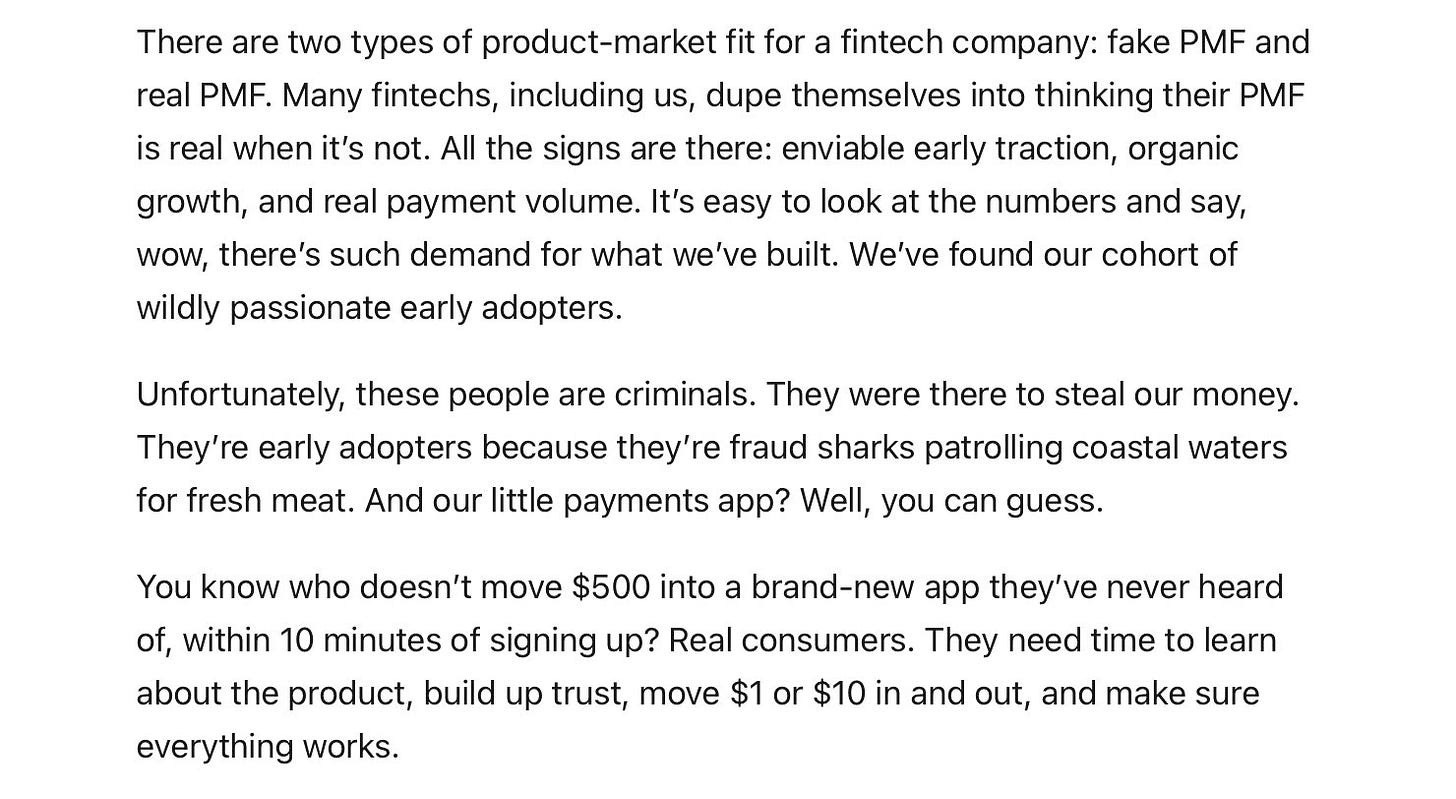Welcome and happy Humpday.
Joel Embiid scored 70 points against generational talent Victor Wembanyama, and it was the worst individual high-scoring NBA performance I had ever seen 🏀.
Nigeria plays our continental archnemesis Cameroun
(Who always beat us)in the round of 16 of the African Cup of Nations ⚽️.Brex reorganises its business operations, letting go of its COO and CTO 💳.

This post is inspired by the new viral article titled “Don’t be a fool, don’t be a PM”
Fintech Theory: Using technology to modify, enhance, and automate financial services for businesses and consumers, They also challenge the existing traditional players in the industry by offering new ways to operate and interact with the financial services ecosystem.
Fintech Reality: Building beautiful UI components and wrappers, to provide a faster/cheaper experience for customers on top of existing legacy infrastructure, and multiple layers of partnerships.
Traditional banks across the world have become lazy, razz, and lag behind technological advancements and customer experience for customers.
They have decided to focus on growing their revenues and providing value for their shareholders, at the expense of customer experience and any activity that does not immediately tangibly and directly contribute to the attainment of their aforementioned goals.
This is where you talented individuals come in. After all, “building a fintech is easy™️, why do banks and legacy institutions suck at providing an enjoyable experience.”
But before you quit your day job, thinking you can turn that wallet service, web crawler, API Wrapper, or beautiful figma screen into a business, here are some things you should take note of.
Customers want everything for free: The neobanks of yore decided to use free and subsidised service as an acquisition tool for customers, leading to a new generation of better-informed customers, who have infinite options and want your services for free or at discounted prices. Worse still, these same customers seem to still be joined at the hip with their traditional banks, charges, bad service, and all.
Your margins are non-existent: Most fintechs are traditionally software businesses, moving bits instead of atoms. These are the kinds of businesses investors and various business school case studies have all said we should build as part of the fourth industrial revolution. Yet it seems the legacy businesses with multiple physical branches and infrastructure seem to eke out very healthy margins when compared to fintechs. Littered across the world are stories of various fintechs struggling to break even despite the volume of business transactions they seemingly power. GTCO currently has an NGX-leading 48% Cost to income ratio, while Tyme Bank, one of Africa’s oldest digital banks finally swung to profit in December 2023.
Banks seem to keep winning: Seems like we are at peak fintech right? Fintechs were supposed to kill the banks. Yet Jamie Dimon just celebrated the biggest year ever by a US bank, and Larry Fink is back to managing 10 Trillion dollars.
In Nigeria, We now have 5 banks as members of the Trillion Naira club, (After just having 2 for the better part of 6 years), and it seems all they had to do was to let neobanks commoditise basic easy to replace bits of offering financial services, that served the cheapest set of customers, allowing them to use fintechs as an acquisition tool for more business volumes and customers.
Jamie Dimon is on Capitol Hill every week teasing a presidency run, Tony’s IG could pass off as that of a black Hugh Heff, Herbert’s Twitter could rival Simon Sinek’s in terms of motivational content, Segun and Jim probably still don’t know what social media is, but you my friends have to deal with irate customers directly on social media. When are you supposed to hunker down and deliver value then?
Valuations do not correlate with reality: I concede that valuations are in the eyes of the beholder, but that's as far as I can concede.
No people! a “big fintech” cannot buy a ” mid-tier bank”. You industry folks love to make this argument about how fintechs can acquire banks (and run them better - LOL) due to the gaps between fintech and bank valuations. I believe the theory of (mis)aligned incentives may be the reason such heresy is gaining mainstream popularity.
As of January 2024, The biggest fintech in Africa is allegedly worth 2.7 Trillion naira (At the official USD/NGN rate of 910), a valuation larger than that of the 5 biggest financial services companies in Nigeria, which consistently mint annual profits of over 100 Billion Naira. Those are hard numbers you have to compete against as a fintech with an outsized valuation. Goodluck returning value at these numbers that are far from reality.
Fraudsters: I hate to be the bearer of bad news, but every new fintech venture announced in this market already has >1K sign-ups in the first week.
It does not matter whether you are a consumer or a B2B fintech provider. The fraud ecosystem will welcome you by helping you exploit your system vulnerabilities and derailing your launch, as you divert all your energies dealing with chargeback or legal issues.
Even the BigCos are not exempt from this. The only difference between them and you is that they have established fraud teams, a fraud budget, and relationships with the Police and other agencies on how to navigate and manage their fraud exposures. The financial services fraud industry is currently a 9 Billion Naira a quarter industry. Do you have the capacity to deal with this?
Amanda Peyton of Braid App summarises her experience dealing with fraudsters better here.
Limited communication within the industry: As a follow-up to the last point on fraud, Fintech providers across the world generally seem reluctant to share information on trends and customer behaviour. These industry players seem to keep operating in secrecy thinking trade secrets and discoveries are novel, leading to almost every new player burning money, time, and effort rebuilding the wheel while fraudsters and hackers collaborate to reuse the same techniques in carrying out successful attacks. Legacy institutions have historically worked together to innovate around transfer speeds and defining identity management frameworks to use for managing fraud, while fintechs are still having secret meetings on a fraud blacklist.
Regulators who need to go outside and touch grass: The CBN is one of the more forward-thinking financial services regulators in Nigeria, and that's saying a lot, given the quality of regulatory oversight and regulatory collaboration they provide. Regulation lagging behind innovation is a global problem, but in Nigeria engaging with regulators always seems to highlight the disconnect between the humans in these offices and the industry they’re supposed to provide oversight and operational guidelines for. Dealing with unclear regulations, in any form, has historically led to fines, bans, and total disconnection of services and even court-mandated or regime-change policy reversals by the regulators. Your existence is under threat depending on the leanings of the regulator of the day.
Social media platforms: Social media being the primary acquisition and growth channel for fintech businesses has been a blessing: the money you don’t spend on having a large marketing team is spent on digital ads and the creation of social media strategies geared at virality and acquisition. Sounds sweet right? Well, in this business of managing and handling money, customers are rightfully impatient and often irate when things do not go as expected. Competitors can also plant falsehoods about your business operations to induce panic and trigger fintech bank runs and withdrawals, causing reputational damage amongst other things.
Experience in this space has taught us that transfers will fail on the last days of every quarter and major long holidays, yet Bank CEOs do not have customers berating them on social media.
Meanwhile, your favourite fintech execs can not even use their Twitter accounts in peace during a liquidity crisis, peak traffic hours, or when a transaction takes 3 minutes more than expected to complete. Honestly not worth the stress in my opinion.
If at the end of this, I haven’t convinced you to keep your day job, and you still want to save the world, bank the unbanked, or provide better financial services infrastructure to businesses, what you have going for you is that traditional banks are going to keep ignoring whatever problem space you have identified, giving you just enough headstart to build an anti-fragile business, before they attempt to copy you.
Just do not die, but please remember that there is a reason banks avoid some ideas, and it's not always because they’re stupid.
May you find ease doing fintech🙏🏾.
(An unedited version of this essay has been posted on my blog, along with the Raison d’être of this newsletter.)




The reality of the industry beautifully revealed. Thanks for sharing this!
Incredible post Nnana. Lovely writing!